When it comes to football-related films and TV series, many people think of titles like "Goal!" and "Bend It Like Beckham", and those who are a bit older might mention "Victory". These works often focus on players and their efforts to balance football and life. Sports films, as a genre that stands the test of time, are often accompanied by elements of inspiration and reality. Today, I'd like to introduce a 2020 Apple TV+ original series "Ted Lasso".
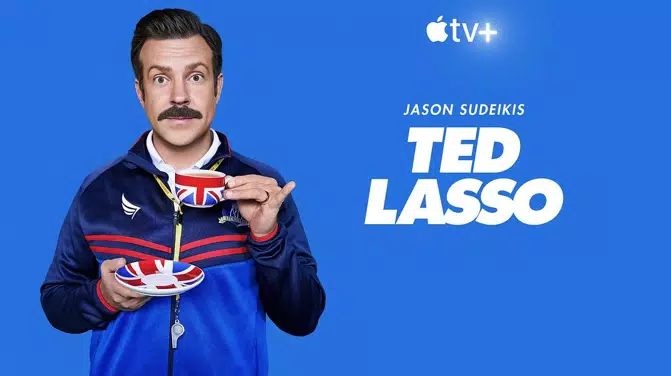
"Ted Lasso" is named after the main character Ted, an American football coach, who is invited by the English football club AFC Richmond as a British football coach and leads the team in the Premier League, despite being a mid-to-low-tier team. Throughout this period, Ted must tackle various challenging issues, such as the conflicts in the locker room between a talented but troublesome player on loan from Manchester City Football Club and a respected former captain who joined from Chelsea; the romantic relationship issue between the team's public relations manager and the players; the interference from the club's chairman, which affects Ted's tactics and strategies; the team-building issues arising from the targeted bullying of a young African player by local British players; and the precariousness of Ted's position due to the mistrust of local fans.
Just by touching on the topic of wealthy clubs renting out players, this drama is already one of the most respectful sports movies about professional football. Because it is a sport that is not about on-field battles but involves a lot of interpersonal relationships. Compared to the closed ecosystem of the American sports scene, European football, with its clear hierarchy and continuous flow, often sees unilateral movement between clubs. As a true-born American, Ted Lasso will fully experience the differences between these two sporting ecosystems in a British town.
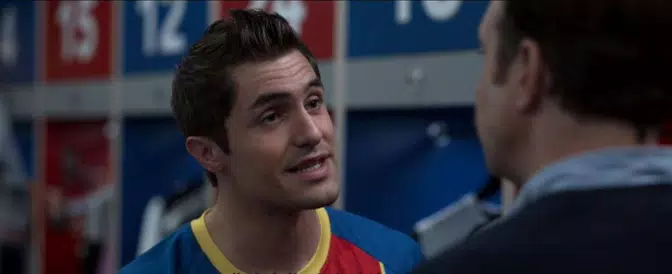
Some may wonder: What kind of Premier League club would be absurd enough to invite an American football coach to coach their team? Well, the series itself is a product of absurdity. The character Ted Lasso originated from two commercials filmed in 2013 by the American television network NBC to promote Premier League broadcasting. In the commercials, the American football coach Ted Lasso, portrayed by Jason Sudeikis, a regular cast member of the comedy show "Saturday Night Live," played the roles of the head coaches for Tottenham Hotspur F.C. and Leicester City F.C., respectively. Being completely clueless about football, he caused quite a few laughs in the United Kingdom. Through the jokes, these commercials playfully introduced a lot of information about football, the Premier League, and Britain to American viewers. They can be considered classic examples of marketing in the advertising industry.
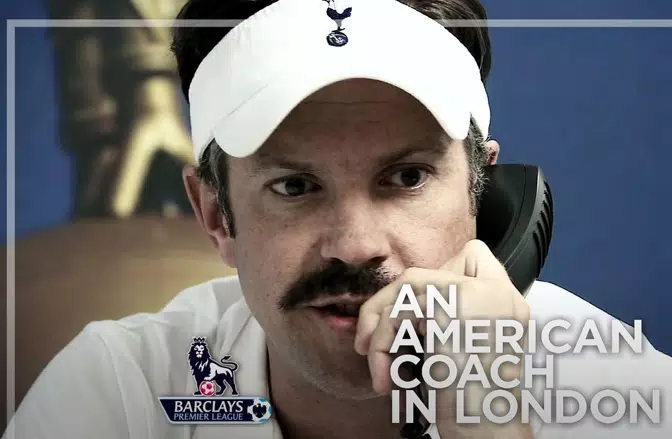
In the first commercial, Ted asks the assistant coach about the hometown of Gareth Bale, the star player of Tottenham Hotspur at the time. The assistant tells him that Bale is from Wales. Ted then asks, "Isn't Wales part of England?" This leads to the assistant explaining the composition and history of the United Kingdom to him. In the second commercial, Ted uses various metaphors to introduce the major powerhouses of the Premier League to American viewers. Manchester United F.C. is described as the team that everyone loves and hates, like a cowboy team, while Manchester City Football Club is likened to the emerging aristocrat Jennifer Lawrence. These two commercials received extraordinary praise. Seven years later, the spin-off series produced by Apple finally went into production.
Obviously, the TV series couldn't have Ted as the head coach of Tottenham Hotspur F.C. or Leicester City, so a fictional club called AFC Richmond was created. Based on official Twitter accounts and the environment of AFC Richmond, we can deduce that is Brighton, currently ranked 16th in the Premier League. And their away kit is light blue, just like Brighton's. The home kit of AFC Richmond, with its red and blue striped pattern, clearly imitates Crystal Palace, another mid-to-low-tier Premier League team.

While commercials are responsible for fragmented comedic sketches, when expanded into a television series, the script requires more intricate detailing. First and foremost, it involves providing a more specific and localized background for the character Ted Lasso. In the commercials, he was merely a football coach. In the series, Ted Lasso is a champion coach in the NCAA Division II American football league. Leading his college team to win the Division II championship is only a secondary reason for his fame. The real reason Ted Lasso became an internet sensation is because of his post-championship dance video in the locker room.
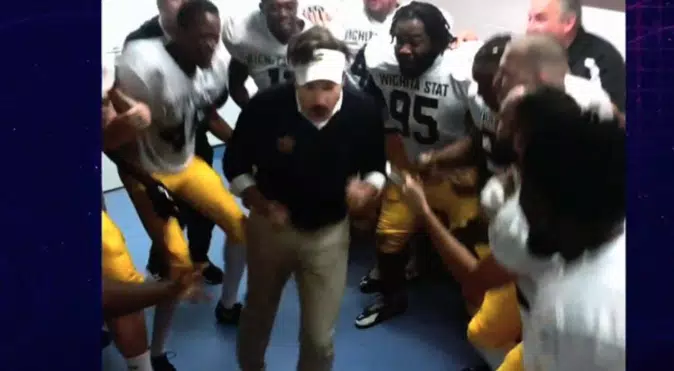
Commercials don't need to explain why Premier League clubs would hire Ted Lasso, but the television series has to offer a rational explanation. The absurdity behind hiring a football outsider as a coach in the series is quite outrageous. The club's former owner, who had an affair leading to a divorce, ended up with sole ownership of the club after the division of assets. The ex-wife, with no interest in football, decides to use every legal means to humiliate the club and use the sport her ex-husband loved to hurt him in return. Therefore, Ted Lasso not only faces a world he knows nothing about but also deals with an extremely hostile political environment.
Now that we know why AFC Richmond hired Ted Lasso, the question remains: Why did Ted Lasso accept the invitation?
The commercials avoided discussing such specific background details, but in the series, the motivation for his venture into an unknown world overseas shapes the character of Ted Lasso. Like in all sports inspirational films, the protagonist's struggles are not limited to the sport itself but involve their troubles or pain in the real world.
In the opening of the first episode, Ted asks his assistant, who is also his close friend, the following question: "Are we nuts for doing this?"
After receiving an affirmative answer, Ted smiles. His adventurous and optimistic spirit leads him fearlessly into the unknown. Every person is a slave to their character, even if they know that the road ahead may be dangerous, they can only move forward without turning back. Ted's optimism and adventurous spirit help him lead the college team to victory, but they also strain his family relationships. In the closing moments of the first episode, we finally see that the forever-joking typical American lies in the most painful battle of his life—to maintain a family that no longer loves each other. Ted's decision to accept the job in England is, to some extent, an attempt to alleviate family conflicts.

After discussing all these background details, I want to highlight the biggest difference between the series "Ted Lasso" and other sports-themed works like "The Queen's Gambit" or "The Blind Side": it truly portrays the management details in competitive sports that often go unnoticed by fans. In the Premier League, the head coach is referred to as a "Manager" not a "Coach", because he may not even need to focus solely on tactics and strategy. For example, during Louis van Gaal's tenure as the head coach of Manchester United F.C., he ordered the planting of trees outside the training ground. When Mourinho was a coach, he canceled the players' vacations.
From an industry perspective, players are both assets and costs for the club. As a manager, the priority should be to increase the club's value. In this series, on his first day, Ted Lasso asks every player to write an anonymous letter specifying the one thing they are most dissatisfied with at the club. Ted knows well that cheering slogans won't help much for professional players; The best way to bring them together is to genuinely address their work-related troubles. This series could be classified as a feel-good drama because Ted Lasso is an extremely positive and kind-hearted person who, from the beginning, is mocked by the town's fans and even publicly humiliated by the star player, but eventually gains support from top to bottom within the club. A good person received good rewards. It may not seem realistic.
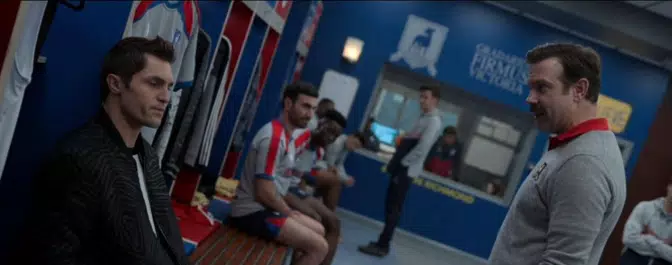
If you're a fan, there are more inside jokes in "Ted Lasso" that will make you smile. For example, the star player of AFC Richmond gets involved with the PR personnel, leading to leaked tactics. This inevitably brings to mind the rumors surrounding Casillas, the captain of Real Madrid CF, and his journalist girlfriend during Mourinho's time. What's even funnier is that Apple arranged a virtual conversation between Mourinho and Ted Lasso to promote the series. In the short video, Ted Lasso seeks advice from him, and Mourinho says there's only one piece of advice: say less to the press.
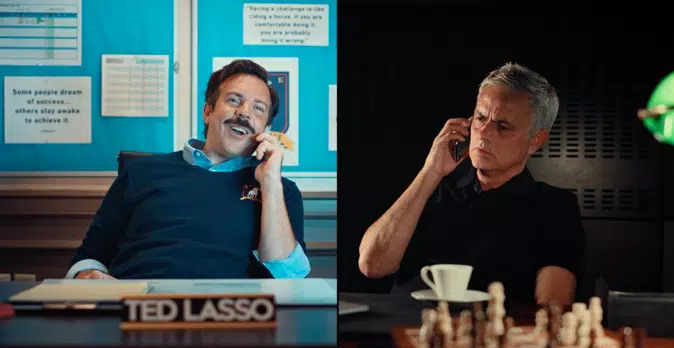
Unfortunately, due to budget reasons, the series doesn't feature any other star players or coaches in cameo roles. The only real-world team portrayed extensively is Manchester City Football Club, which happens to be AFC Richmond's opponent in a decisive battle when they are on the verge of relegation. As mentioned earlier, AFC Richmond's star player, Jamie Ted, was loaned from Manchester City Football Club. This showdown in the finale episode has a strong Premier League atmosphere. I won't spoil the outcome here.
Finally, I want to say that although this series has a strong respect for football, it is ultimately a comedy. Almost all the jokes from the two NBC commercials are recreated in the series, which may make certain scenes seem somewhat detached from reality. For example, Ted Lasso's lack of knowledge about football leads him to graft American football tactics onto soccer, which is a bit exaggerated.
Also, this series is not about outsmarting others. It is a story about team growth and how the character of Ted Lasso positively influences those around him, including friends, enemies, and the environment. In a year as difficult as 2020, the internet is filled with angry and selfish people, always carrying baseless anger, questioning motives, and criticizing actions. This is why "Ted Lasso" is even more effective. It comforts evil thoughts and inspires kindness.

With his American-style optimism, Ted Lasso changes the ironic trend of British tradition through kindness and justice. In the series, the former owner of the club, who was determined to ruin the team, commissions a journalist to write a smear piece on Ted. Unexpectedly, even he is moved by Ted, and in the report, writes, "Though I am extremely pessimistic about Ted Lasso's future, I predict his team will fail. But when failure comes, I will never ridicule him."
Will kindness and justice prevail? Perhaps not. But that doesn't mean we should stop spreading kindness, just as I won't stop recommending this comedy that originated from an advertisement.






Share your thoughts!
Be the first to start the conversation.